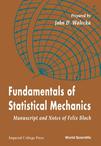统计力学基础
出版时间:2000-12 出版社:Penguin 作者:Walecka, John Dirk; Bloch, Felix; 页数:302
Tag标签:无
内容概要
The 1952 Nobel physics laureate Felix Bloch (1905-83) was one of the titans of twentieth-century physics. He laid the fundamentals for the theory of solids and has been called the "father of solid-state physics." His numerous, valuable contributions include the theory of magnetism, measurement of the magnetic moment of the neutron, nuclear magnetic resonance, and the infrared problem in quantum electrodynamics. Statistical mechanics is a crucial subject which explores the understanding of the physical behaviour of many-body systems that create the world around us. Bloch's first-year graduate course at Stanford University was the highlight for several generations of students. Upon his retirement, he worked on a book based on the course. Unfortunately, at the time of his death, the writing was incomplete. This book has been prepared by Professor John Dirk Walecka from Bloch's unfinished masterpiece. It also includes three sets of Bloch's handwritten lecture notes (dating from 1949, 1969 and 1976), and details of lecture notes taken in 1976 by Brian Serot, who gave an invaluable opinion of the course from a student's perspective. All of Bloch's problem sets, some dating back to 1933, have been included. The book is accessible to anyone in the physical sciences at the advanced undergraduate level or the first-year graduate level. --This text refers to an out of print or unavailable edition of this title.
书籍目录
PrefaceSecond PrefaceChapter I: Introduction and Basic ConceptsChapter II: Classical Physics 1. Hamilton's Equations 2. Phase Space 3. Liouville's TheoremChapter lll: The Statistical Ensemble 4. Distribution Function and Probability Density 5. M\ean Values Additive Quantities 6. Time Dependence of the Phase DensityChapter IV: Thermal Equilibrium and The Canonical Distribution 7. Stationary Mean Values Conditions of Equilibrium 8. Constancy of the Distribution Function 9. The Canonical Distribution 10. Thermodynamic Functions 12. The Statistical Significance of EntropyChapter V: Applications of Classical Statistics Energy Heat Capacity Entropy Free Energy Distribution in the # Space 14. The Viral Theorem 15. The Equipartitlon Theorem 16. Examples Mean Kinetic Energy Diatomic Molecules Rigid Rotations Vibrations Solids Normal Coordinates Linear Chain Periodic Boundary Conditions Three-Dimensional Solid Black-Body Radiation 17. MagnetismChapter VI: Quantum Statistics 18. Basic Elements of Quantum Mechanics 19. The Density Matrix 20. The Statistical Ensemble 21. Time Dependence of the Density Matrix 22. Thermal Equilibrimn 23. The Canonical Distribution 24. Thermodynamic Functiotls and the Partition Function The Nernst Heat TheoremChapter VII: Applications of Quantum Statistics 25. Ideal Monatomic Gases 26. Mean Energy of Harmonic Oscillator 27. Examples Diatomlc Molecules Specific: Heat of Solids The Debye Approximation Black Body Radiation Magnetism Weiss Theory of Ferromagnetism Transition from Quantum to Classical Statistical Mechanics 28. Identical Particles 29. The Grand Canonical E~emble 30. Fermi Statistics 31. Bose StatisticsAppendix A: Canonical Transformations and Poisson BracketsAppendix B: General Proof of Liouville's TheoremAppendix C: Molecular DistributionsAppendix D: Some Properties of Fourier SeriesAppendix E: Basic Texts and MonographsProblemsIndex
图书封面
图书标签Tags
无
评论、评分、阅读与下载
用户评论 (总计0条)
相关图书
- A First Course in Module Theory (精装)
- 伍兹霍尔数学
- 量子场的分析方面ANALYTIC ASPECTS OF QUANTUM FIELDS
- 基金稳赚一本通
- 地理知识辞典(特价)
- 西班牙语语法和词汇.1
- 新编阿拉伯语教程
- 在中国的日子
- 新编阿拉伯语教程
- 我和庄子有个约会
- 马克思主义文艺学思想发展史(上下)
- 红楼梦哲学精神
- 儒家思想讲演录
- 论语鉴赏辞典
- 山居岁月 Days in a Green Hill(CD)
- 人文中国学报
- 改变生活的七个习惯 时代光华(软件)
- 好友录 Best Friends Autograph Book
- 建筑工程太阳能发电技术及应用
- 气体流量计
- 电磁计量
- 兰生染缬
- 图解天工开物
- 城南工艺美术
- 锦彩纹饰
